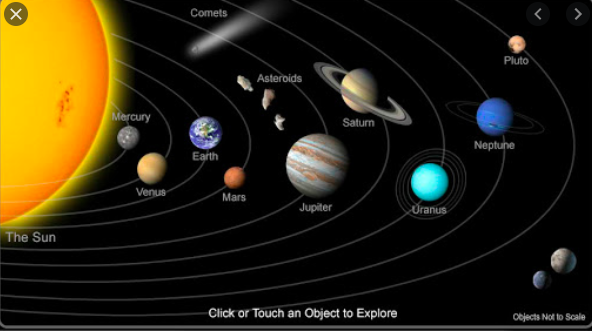26 July - 1 August
Section outline
-
Kia ora...students and welcome to term 3. You have an exciting new context for this term, titled Earth and BEYOND. For this idea we will explore our solar systems, the structure of earth, the water cycle, maps( geographical and climate), how earth is are changing due to human impacts eg farming, fishing, e-waste, oil drilling etc.


Success Criteria: I can/have...
- I have understood what our solar systems looks like and the may concepts linked to space and time
- I have read on the big bang theory and offered my view on this
- I have an understanding of how our solar system influences seasons on earth.
Activities:Testing for prior knowledge
A)Watch the video on our solar system. Write down key words that you have heard.
- A fascinating tour through our solar system, based on NASA's Science on a Sphere program.Also, based on the video create a simple representation of the solar system that gives you an understanding of the planets and their order from the sun. In pairs make a poster of the solar system encourage you to conduct research and learn more about the physical characteristics of each planet.You may use canva .com to design your posterC)Let us brainstorm words that link with space and time. Read this links to support you
Space Word Wall Vocabulary - Teach Starter
B)
- Research what is the big bang theory.
- See images on white board on on solar system. Create a word bank on all words that link with the solar system.You can use vocabulary creator app for this as it gives you the definitions. of each word identified.
- See video on our solar system.
- List the different planets and describe each one briefly in relation to the sun.List what would you find in the solar system.
- Who was the first astronaut to explore travel to space and when did this happen? Explain. this idea in detail with images.Whom is Nasa and discuss the theory of the first person in space.
- Research. the first man landing ion the moon. Where is NASA and various space stations on earth.
- Create an model on the solar system with your table group. Materials provided in class eg play dough and paper.
Resources:
ESA - Space for Kids - Our Universe - The Big Bang
StarChild: The Solar System
Homework:
Write here...EXPLORE / TŪHURA learning intentions:
- We are EXPLORING...key vocabulary and definitions linked to infinity and beyond with links to space and the galaxy.
- We are EXPLORING...to research what does our solar system looks like. Also understanding what my exist beyond our solar system.
- We are EXPLORING...o question if the big bang theory supports how our solar solar began. Or are there alternative theories.
EXPLORE / TŪHURA learning intentions:
- We are EXPLORING...to research and have an understanding of space, the structure of earth and how earth science that include atmospheric levels, water cycles and how are weather/seasons formed
- We are EXPLORING...how landscapes on earth are changing due to human activities and development
- We are EXPLORING...ideas on how local communities( around the world are affected by these activities.
